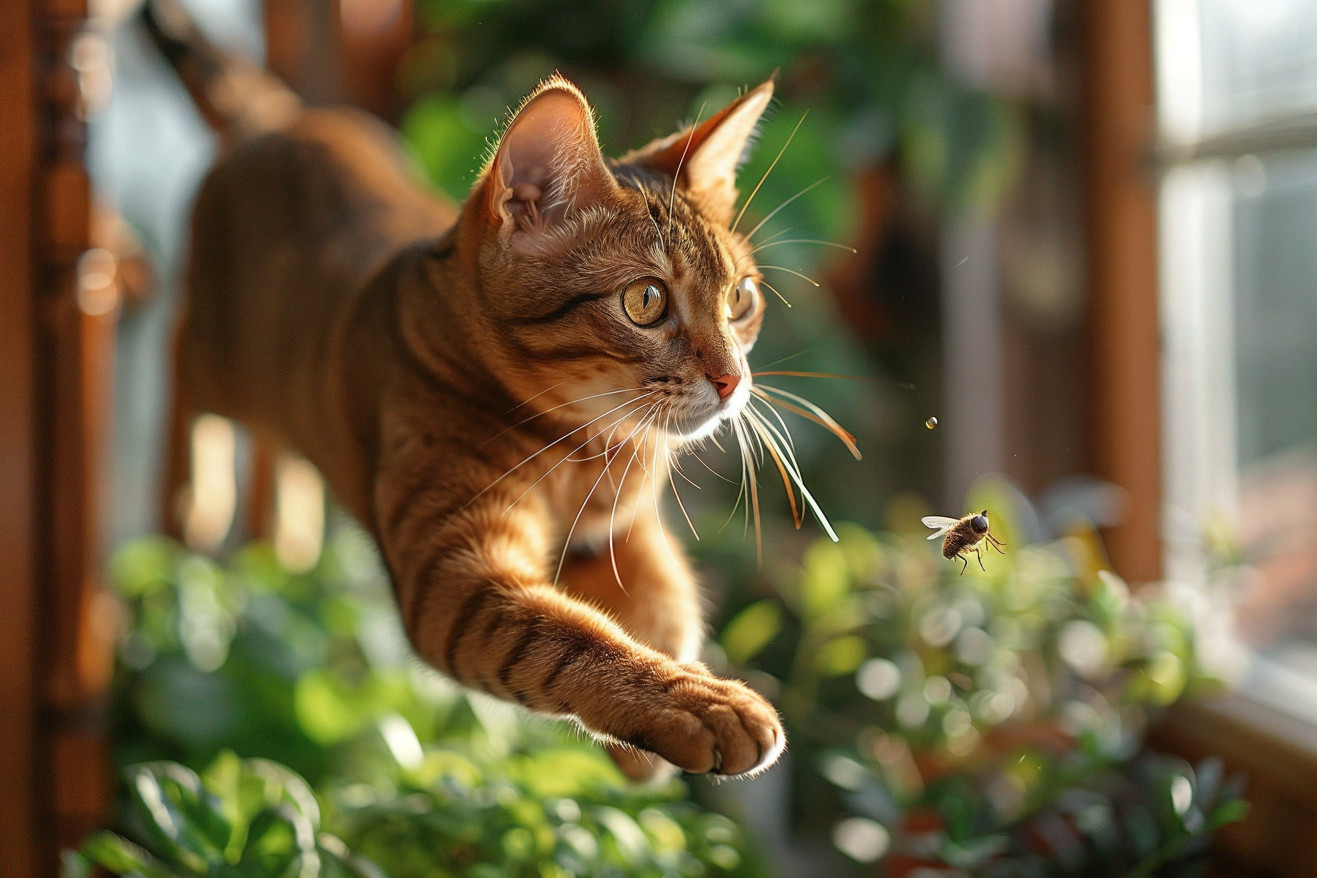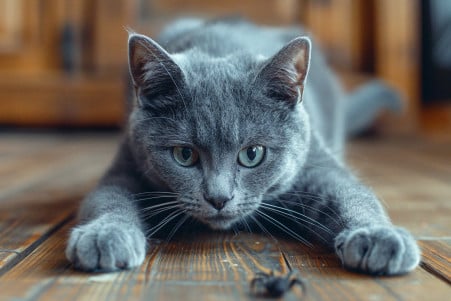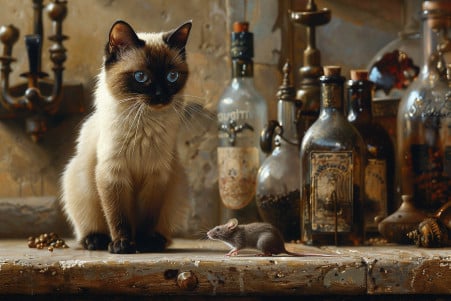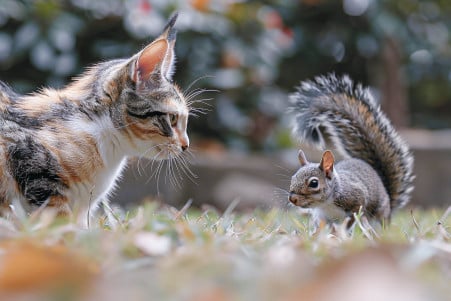Can Cats Eat Flies? Unveiling the Safety of This Feline Behavior
25 February 2024 • Updated 24 February 2024

Cats love to chase and catch flies, but is it safe for them to eat their prey? Cats can eat flies without any issues as part of their natural hunting behavior. Flies can be covered in bacteria, but most microorganisms are killed by a cat’s stomach acid. That said, flies that have been exposed to insecticides can be harmful. If your cat eats flies, make sure to watch them for any symptoms of sickness.
In order to give you a complete view, we’ve included insights from veterinarians and peer-reviewed research on the feline diet and behavior. We’ll take a look at the potential risks and benefits of cats eating flies, discuss why cats eat flies in the first place, and consider what cats’ consumption of insects means for their nutrition.
By the time we’re done, you’ll know exactly what you need to do to make sure your cat stays healthy and happy.
Can cats eat flies?
Risks of Cats Eating Flies
While the occasional fly is probably not going to hurt your cat, Cooper Pet Care explains that some flies can carry microorganisms that could be problematic. These microorganisms could include bacteria that might cause some mild to moderate gastrointestinal upset. In some cases, flies can also carry parasites.
Cats with healthy immune systems are usually good at protecting themselves against these issues because their stomach acid is strong. However, if the immune system is compromised, it can make it easier for parasites to be transmitted. Signs of parasites include weight loss, vomiting, diarrhea, a dull coat, and lethargy.
If your cat is showing any of these signs after eating flies, you should contact your vet right away. This is especially true if your cat has eaten maggots or flies that may have come into contact with pesticides, as these can be very dangerous.
The Spruce Pets also recommends that you take a proactive approach and try to prevent your cat from eating flies by keeping an eye on their environment and finding other ways to satisfy their hunting instincts. By knowing what to look out for and being proactive, you can help keep your pet safe.
Predatory Play in Cats: Why Do They Hunt Flies?
Cats’ desire to chase and catch flies is a result of their predatory nature and is an important part of their overall well-being. According to a study in ScienceDirect, these behaviors are not just a response to hunger but are instead part of a larger pattern of instinctual behaviors. This innate predatory play is important for keeping cats mentally and physically stimulated and ensuring they stay active and alert.
Hunting, including the hunting of flies, is also a form of play that is closely tied to a cat’s predatory instincts. This play is a throwback to the hunting skills of their ancestors and can be hard to separate from predatory behavior. When cats chase after flying insects, they are engaging in a form of play that allows them to practice their hunting skills.
When cats become more interested in catching flies, it can be due to boredom or a lack of certain nutrients in their diet.
This is because they are looking for ways to fulfill their need for mental stimulation and nutritional variety.
However, we can help fulfill these needs by providing cats with opportunities for play and engagement. For example, interactive toys and puzzle feeders can help cats redirect their focus and provide enrichment that is in line with their predatory instincts, according to a study in People and Nature.
This helps ensure that cats’ natural behaviors are being channeled into positive and enriching activities, which is important for their mental well-being and can help prevent nutritional deficiencies.
Evaluating Flies as a Source of Nutrition for Cats
Even though cats may not eat flies on a regular basis, flies can be more than just a reflexive snack. A study published in PMC found that insects like housefly pupae and crickets are high in protein and essential amino acids, both of which are important for cats.
The protein content of these insects is similar to that found in poultry and fish meals, two of the most common ingredients in cat food. Insects also contain essential vitamins and minerals, like B-vitamins and iron and zinc, that are good for cats, according to Animal Wellness magazine.
Insect-based proteins are increasingly being used in commercial pet foods, in part because a study published in Petfood Industry found that insects like black soldier fly larvae are a great source of calcium and crickets are high in taurine, an amino acid that’s essential for cats. Although they aren’t flies, these insects have nutritional profiles similar to flies, suggesting that flies could be a good source of nutrition for cats.
Although a study published in PMC found that the digestibility of insect protein is inconsistent, the emerging field of insect-based nutrition holds promise for improving the diets of cats.
Flies, if eaten in moderation, could be a good source of nutrition for cats, one that’s in line with their natural instincts and ancestral diet. This natural preference for eating insects is an area that’s ripe for more research in the context of domestic cat nutrition and the changing world of pet food.
Cats and Their Impact on Wildlife
While cats are beloved pets, they are also an important predator in many ecosystems. A paper in PubMed looks at the global impact of free-ranging domestic cats on wildlife, focusing on predation and competition. From hunting to eating flies, cats have an impact on wildlife, and that impact can be negative.
It is important to find a way to let cats be cats while also protecting wildlife. The Journal of Environmental Law, which is published by Oxford Academic, explains the negative ecological impacts of free-ranging domestic cats on wildlife, including the extinction of some species. This makes it clear that responsible pet ownership and the creation of policies that let cats act like cats while also protecting wildlife are important.
Cat owners can help protect wildlife from the negative impacts of feline predation by creating controlled outdoor spaces for their pets or providing them with indoor play.
By recognizing the complex relationship between our pets and the natural world, as shown in a paper in the journal People and Nature from Wiley Online Library, we can find ways to live with cats that are sustainable and protect the welfare of both cats and the ecosystems they live in.
Final Thoughts: The Danger and Importance of Cats Eating Flies
In summary, while cats hunting and eating flies is a normal and mostly harmless behavior, there are some things to keep in mind. It’s important for cat owners to understand the potential dangers of flies, such as the microorganisms they carry and the insecticides they may have come into contact with, according to Cooper Pet Care.
Cat owners should also watch their cats for signs of sickness and take them to the vet if they show any symptoms, especially if they’ve eaten a large number of flies.
Cats’ hunting behavior is a natural way for them to play and meet their instinctual needs. This behavior can be managed by providing cats with other forms of enrichment that allow them to express their instincts in a safe and controlled way, according to ScienceDirect.
From a nutritional standpoint, there may be some advantages to eating flies, and Research in PMC suggests that insects are becoming a more acceptable source of protein in pet food. However, it’s also important to remember the ecological impact of cats’ hunting behavior. Responsible pet ownership can help balance cats’ natural instincts with the need to protect wildlife, according to PubMed and the Oxford Academic Journal of Environmental Law.
By learning about and controlling your cat’s exposure to flies, you can help ensure that your cat is healthy and that the environment is protected. This understanding can help you make sure that your cat is coexisting peacefully with the world around them.


